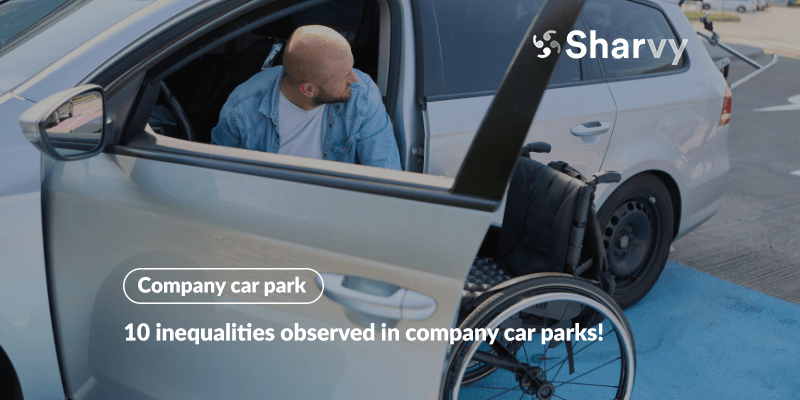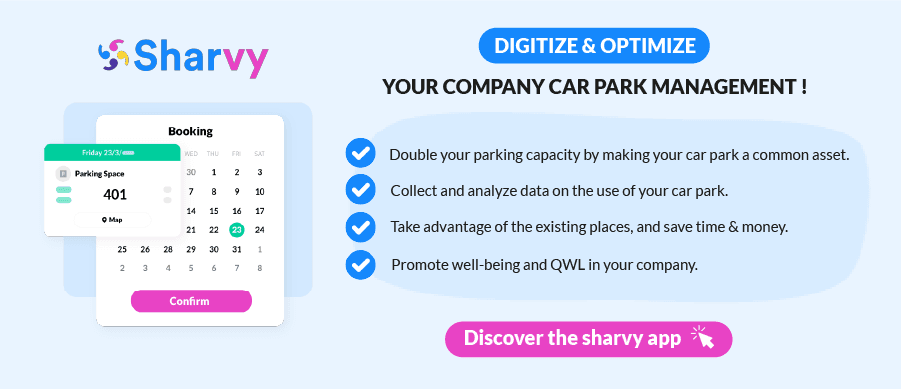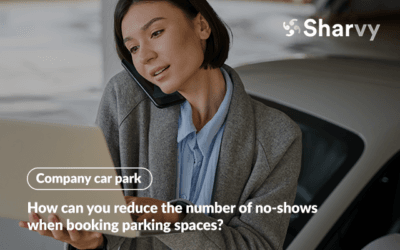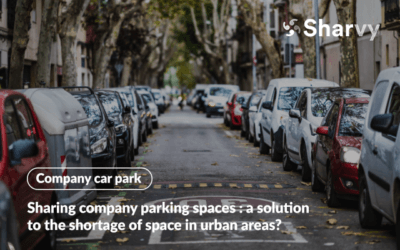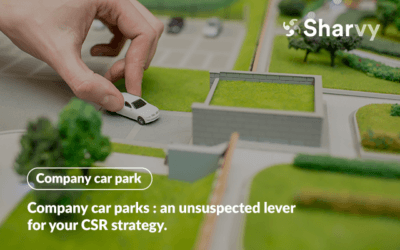Have you ever considered how access to your company car park might reflect deep and insidious inequalities within your working environment?
Although often overlooked, your company’s car park can become a revealing mirror of the disparities in treatment between your employees.
Whether it’s the systematic reservation of the best spaces for senior managers, the absence of solutions for people with reduced mobility, or the priority given to specific vehicles, these inequalities are many and sometimes unjustified.
In a context where the notions of equity & well-being at work are becoming increasingly important, it is crucial to examine parking policies from a new angle.
In this article, you’ll find the 10 inequalities frequently observed in company car parks and the solutions to mitigate their harmful consequences!
What impact do the inequalities observed in company car parks have on QWL & HR policies?
The inequalities observed in company car parks are not without consequences for Quality of Life & Working Conditions (QLWC) & Human Resources (HR) policies.
Indeed, how can a company claim to have a culture of fairness and well-being if the first signs of inequality are to be found in access to basic infrastructure such as car parks?
When certain categories of employees are systematically favored (such as senior managers and management team members), this can lead to frustration and injustice among other employees.
This perception of unfairness, often amplified by a lack of transparency in the criteria used to allocate positions, can undermine management confidence and compromise support for HR policies. What’s more, disparities in access to parking facilities have an impact on the overall satisfaction of your employees, a central element of the QWL.
And yes! How can you hope to motivate your teams if, every morning, some of them have to go around in circles looking for a parking space while others have reserved access?
These inequalities can also hamper retention initiatives, especially among new talent and employees with reduced mobility, who may feel marginalized.
Against this backdrop, HR departments must consider more inclusive parking policies to ensure equal treatment and foster a more harmonious and equitable working environment.
Sharvy’s teams can help your company take this step! Request a demonstration of the solution & find out how Sharvy can solve your parking problems.
What are the top 10 inequalities in company car parks?
1. Executive privilege: an outdated model?
The practice of reserving parking spaces for senior executives is deeply rooted in many companies. This privilege, often perceived as a sign of recognition of hierarchical status, nevertheless creates visible inequalities from the moment employees arrive at work.
While some consider this practice a fair advantage linked to responsibility and seniority, others see it as a form of favoritism that accentuates the distance between different hierarchical levels.
For example, in some companies, managers have access to « premium » parking spaces close to the main entrances, while lower-ranking employees have to park further away or even off-site!
This practice can be particularly unpopular! Particularly in environments where parking space is limited. Employees could be frustrated to see unused spaces reserved for managers who (very often) are away several days a week.
In a modern working environment, where collaboration and equality of opportunity are increasingly valued, this policy may seem outdated. Therefore, it is legitimate to ask whether this distinction should not be re-evaluated.
✔️ Our expert advice!
Some companies (Sharvy customers) have decided to allocate parking spaces according to personal needs (families with children, pregnant women, employees with reduced mobility) rather than according to hierarchy. This is the case with UpCoop– read the case study to learn more!
2. Seniority as an award criterion: is it still relevant?
The allocation of parking spaces according to seniority is based on the idea that employees who are the most loyal to the company should benefit from certain advantages, particularly priority access to the company car park.
Although this policy may seem logical, it has several limitations at a time when companies are seeking to attract new talent and promote equality between all their employees.
While this system rewards loyalty and stability, it can also generate frustration among young recruits forced to park their vehicles further away in (often) less favorable conditions.
So, in a constantly changing professional environment, the relevance of seniority as a criterion deserves to be reassessed to better adapt to current realities.
✔️ Our expert advice!
Employee needs and expectations regarding workplace equality are constantly evolving. It would be appropriate to regularly reevaluate the criteria for allocating parking spaces, in consultation with employees and staff representatives, to ensure that the system remains fair and adapted to current realities.
3. Does the “first come, first served” system create inequalities in company car parks?
The “first come, first served” system allocates parking spaces according to the order in which employees arrive. While this may seem egalitarian on the surface, as everyone theoretically has the same chance of obtaining a space, this system quickly reveals inequalities, particularly for employees working flexible hours.
The latter, forced to arrive later, are often at a disadvantage, finding themselves without space and forced to park at a distance.
In principle, this system encourages punctuality and avoids complex space allocation management, as each employee is responsible for his or her own access to the car park.
However, it penalizes employees with flexible working hours, such as those who, for family reasons (dropping their children off at school, for example), are unable to arrive early. The same applies to employees who work part-time from home, who may systematically lose their parking space when they come into the office later in the day.
✔️ Our expert advice!
In response to these inequalities, some companies are introducing advance reservations via applications such as Sharvy, or weekly seat rotations, guaranteeing everyone fair access without being tied to arrival time.
4. Reserved spaces for customers & visitors: a necessary evil?
Many companies reserve parking spaces for their customers & visitors, an essential gesture for projecting a professional image & facilitating the visitor experience.
These spaces, often close to the main entrances, offer visitors easy and immediate access, reinforcing the company’s reputation.
However, this practice can be frustrating for employees, particularly when these spaces remain vacant for long periods, depriving them of an available parking space.
✔️ Our expert advice!
To reconcile the needs of visitors and employees, some companies introduce limited time slots for reserved spaces, or allow employees to access them when there are no visitors, using a flexible reservation management system. This feature can also be found on the Sharvy application for managing company car parks.
5. The lack of adapted spaces for PRMs: one of the main inequalities in company car parks!
Many companies continue to struggle with the lack or inadequacy of parking spaces adapted for people with reduced mobility (PRM).
This lack of consideration makes it difficult for employees to access the workplace, limiting their independence and integration.
Yet, it’s crucial to note that legislation, particularly in the UK, requires companies to reserve a certain percentage (2%) of parking spaces for PRMs, generally located near entrances to facilitate access. This is not just a suggestion, but a legal requirement that must be met.
✔️ Our expert advice!
You can set up a parking space reservation system, with priority access for people with reduced mobility. In this way, you promote fairness by taking account of individual characteristics.
6. Favoritism in the allocation of places: a latent problem?
Although it is often subtle, favoritism in the allocation of parking spaces can greatly affect team cohesion & the perception of fairness within your company.
This favoritism can manifest in various ways, such as the informal reservation of spaces for certain employees close to management and others benefiting from privileged relationships with managers. For example, sometimes unofficial seats are « » reserved for influential colleagues without any clear rule justifying this allocation.
This type of preferential treatment can create tensions, fuel a feeling of injustice among employees, and damage the collective dynamic, as employees who are not given preferential treatment will feel marginalized.
✔️ Our expert advice!
Transparent and fair car park management, with allocation criteria clearly communicated to all employees, is essential for restoring trust. For this reason, you can opt for space rotation systems and objective allocation criteria (PRM, medical constraints, etc.) to avoid any perception of favoritism.
7. Disparities between company sites: a geographical inequality?
In multi-site companies, it is not uncommon to observe significant disparities in car park management depending on geographical location.
Some sites benefit from spacious car parks, while others in dense urban areas need more space. This leads to frustration and unequal treatment of employees, which can accentuate inequalities within company car parks.
For instance, within the same company, a site on the outskirts may boast abundant parking spaces, while another in the city center is forced to operate on a ‘first come, first served’ basis. This stark contrast in car park management within a single entity underscores the extent of the issue.
✔️ Our expert advice!
To reduce these inequalities, you can place standardized policies for allocating parking spaces, whatever the site. This way, you can ensure that every employee benefits from equitable solutions, even if local constraints differ. Tools such as access control via a plate-recognition camera or an IoT module, coupled with an application such as Sharvy, can facilitate more fluid & uniform management. These technologies make it possible to centralize seat allocation, check access, and offer alternative solutions such as early booking.
8. Lack of transparency: why is it crucial to be clear about allocation criteria?
When allocation criteria are not explicitly communicated, this can quickly give rise to suspicions of favoritism & a perception of unfairness, reinforcing inequalities within company car parks.
This vagueness in the rules undermines team cohesion and erodes trust in management. Your employees may feel that some are being favoured for no apparent reason, exacerbating inequalities within company car parks.
✔️ Our expert advice!
To remedy this, it is essential to establish objective and easily accessible criteria (specific needs, car-pooling, PRM, etc) and to communicate them regularly to employees.
8. Priority for car-poolers and users of environmentally-friendly vehicles: a good idea?
Although this initiative has laudable environmental objectives, it may also create inequalities within company car parks for employees who lack the financial resources to buy an electric vehicle.
Similarly, car-sharing is not a viable option for everyone. Employees living in rural areas that are poorly served by public transport & car-sharing networks often have no choice but to travel to work by private car.
This situation gives rise to indirect discrimination, as employees who are not eligible for car-sharing benefits often have to park far from their place of work.
✔️ Our expert advice!
To reduce these disparities, you could, for example, offer subsidies & reimbursements to employees using public transport. This would encourage eco-friendly alternatives while offering accessible options to those who can’t afford to own an electric vehicle.
10. Lack ofalternative solutions: what can be done for employees without access to the company car park?
In areas lacking parking, the absence of alternative solutions can create significant inequalities between employees who need access to company car parks.
Employees are often forced to pay for on-street parking spaces, which are far away and often expensive, adding financial and logistical pressure to their daily lives.
✔️ Our expert advice!
To remedy this, companies can consider using shuttles to link up work sites,negotiate partnerships with private car parks in the vicinity, or reimburse the transport costs of the employees concerned. These solutions offer fairer mobility management while improving employee well-being.
In conclusion
One of the most innovative solutions to the inequalities observed in company car parks is the use of company car park management tools, such as Sharvy.
The application offers flexible & dynamic parking space management according to your employees’ actual needs, rather than rigid hierarchical criteria. Thanks to Sharvy, your employees can reserve parking spaces in advance, avoiding the frustrations associated with a lack of parking.
What’s more, by integrating this solution, you are encouraging more sustainable practices, optimizing the use of your car parks, and facilitating initiatives such as car sharing. This helps reduce inequalities and creates a more inclusive working environment that respects environmental issues.
Got a question? Check the following FAQ !
Do companies have any legal obligations regarding the layout of car parks?
Companies have to comply with certain regulations, particularly in terms of accessibility for people with reduced mobility. However, over and above legal obligations, it is often up to companies to determine how they wish to manage the allocation of parking spaces.
Should companies include equal access to car parks in their CSR (Corporate Social Responsibility) policies?
Absolutely. Equal access to facilities such as company car parks can be part of an overall CSR policy that promotes inclusiveness and the well-being of all employees, while reinforcing a positive corporate image.
How can companies assess the fairness of their car park management?
Companies can conduct internal employee surveys to identify sources of dissatisfaction and perceived inequality. They can also analyse the use of spaces and accessibility for different groups, and compare these data with equity objectives.
Want to find out more? Check out our latest articles!
How can you reduce the number of no-shows when booking parking spaces?
What are no-shows in company car park reservations? What are the disadvantages? How can they be reduced? Focus.
Sharing company parking spaces : a solution to the shortage of space in urban areas?
What is the sharing company parking spaces? Is it a solution to the shortage of parking spaces in urban areas? Focus.
Company car parks : an unsuspected lever for your CSR strategy.
How can your company car park support your CSR strategy in environmental, economic and social terms? Here’s our advice!
The solution
Resources
Contact us
+44 117 463 6990

